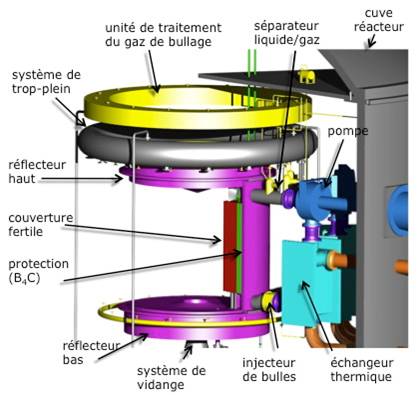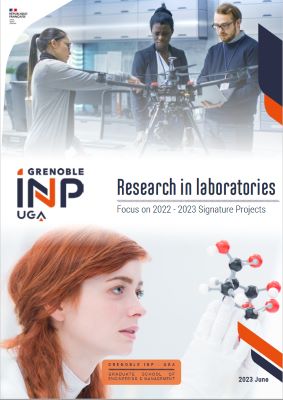Thorium is often considered to be the future of nuclear energy, just like its only alternative, uranium-238. At Grenoble INP, the researchers from LPSC are working on a molten salt fast reactor (MSFR) that is fuelled by thorium.
Infinitely more abundant in nature than fissile uranium-235, thorium can be converted by neutron capture into fissile uranium, whence the idea of developing breeder reactors fuelled by thorium that would solve all the energy resource problem for the next ten centuries in the opinion of Elsa Merle-Lucotte, lecturer at Grenoble INP - Phelma and researcher at LPSC. Thorium reactors would naturally reduce the generation of long-lived waste such as minor actinides. The waste produced by thorium reactors remains radioactive only for between ten and fifteen years for the most part, with just 0.01% radioactive for thousands of years.
The scientists at Grenoble INP believe in the future use of thorium in molten salt fast reactors: "In this case, the coolant would be a mixture of fluoride salts brought to a very high temperature." Since this type of reactor operates at atmospheric pressure and has no reactivity reserve in its core, it would be particularly safe. The liquid state of the fuel also raises the possibility of reprocessing whilst the reactor is operating. "It is possible to regularly extract fission products from the fuel, to purify it and even to adjust its composition which, as a result, always remains optimal."

There is another advantage: if cooling is lost in the reactor core, as was the case at Fukushima, the liquid fuel can be quickly drained using gravitational flow (and without the need for human intervention) into tanks designed to cool the fuel passively over long periods of time. Finally, as the fuel is insoluble in water and non-explosive, it would solidify if there was a break by cooling down to less than 500 degrees.
Numerous joint research projects between industrial companies (AREVA, EDF, etc.) and academic institutions (CEA, Grenoble INP, CNRS, etc.) are devoted to the subject. At Grenoble INP, a structuring project has recently been obtained to meet the scientific and technical challenges that remain.
Infinitely more abundant in nature than fissile uranium-235, thorium can be converted by neutron capture into fissile uranium, whence the idea of developing breeder reactors fuelled by thorium that would solve all the energy resource problem for the next ten centuries in the opinion of Elsa Merle-Lucotte, lecturer at Grenoble INP - Phelma and researcher at LPSC. Thorium reactors would naturally reduce the generation of long-lived waste such as minor actinides. The waste produced by thorium reactors remains radioactive only for between ten and fifteen years for the most part, with just 0.01% radioactive for thousands of years.
The scientists at Grenoble INP believe in the future use of thorium in molten salt fast reactors: "In this case, the coolant would be a mixture of fluoride salts brought to a very high temperature." Since this type of reactor operates at atmospheric pressure and has no reactivity reserve in its core, it would be particularly safe. The liquid state of the fuel also raises the possibility of reprocessing whilst the reactor is operating. "It is possible to regularly extract fission products from the fuel, to purify it and even to adjust its composition which, as a result, always remains optimal."

There is another advantage: if cooling is lost in the reactor core, as was the case at Fukushima, the liquid fuel can be quickly drained using gravitational flow (and without the need for human intervention) into tanks designed to cool the fuel passively over long periods of time. Finally, as the fuel is insoluble in water and non-explosive, it would solidify if there was a break by cooling down to less than 500 degrees.
Numerous joint research projects between industrial companies (AREVA, EDF, etc.) and academic institutions (CEA, Grenoble INP, CNRS, etc.) are devoted to the subject. At Grenoble INP, a structuring project has recently been obtained to meet the scientific and technical challenges that remain.
SUMMARY
- Editorial : Jobs for at least 40 years!
- Preparing for the future of the nuclear industry
- The nuclear industry also needs more general profiles
- Why train engineers in nuclear energy?
- A promising future for professions in the nuclear sector
- Thorium: the green future for nuclear power?
- IFCEN: a project in support of the French nuclear industry
- The importance of materials in the nuclear sector
- First-hand account from Boris Supiot, an engineer at AREVA
- Millennium interview: Nearly 50% of the workforce needs to be replaced





